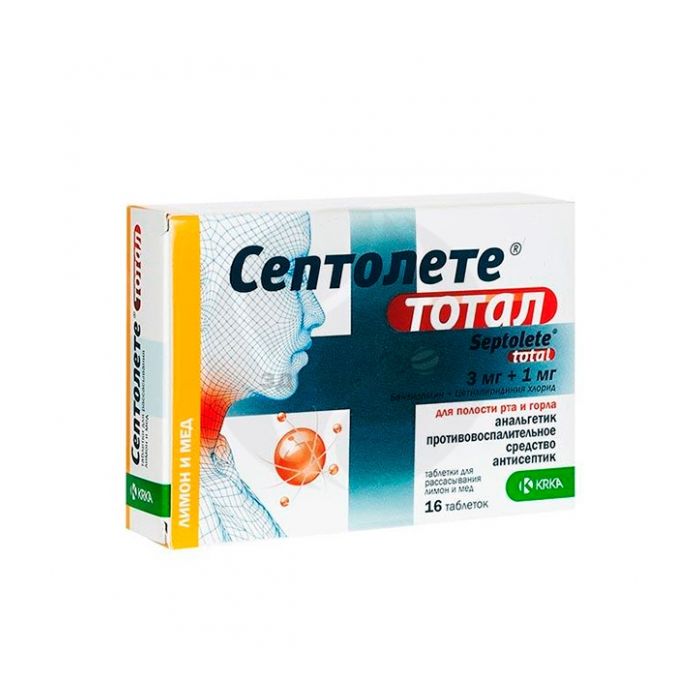Septolete Total tablets honey-lemon, No. 16
Expiration Date: 11/2025
Russian Pharmacy name:
Септолете Тотал таблетки мед-лимон, №16
The tablets should be slowly dissolved in the mouth every 3-6 hours.
Adults, elderly patients and children over 12 years of age
The recommended dose is 3-4 tablets per day. Do not exceed the indicated dose. To achieve an optimal effect, you should not use SeptoleteЃ Total immediately before or after brushing your teeth.
SeptoleteЃ total should not be used concurrently with other drugs from the antiseptic group. SeptoleteЃ total should not be used for more than 7 days.
1 lozenge lemon and honey contains:
Active ingredients:
Benzydamine hydrochloride 3.000 mg Cetylpyridinium chloride monohydrate 1.050 mg, equivalent to cetylpyridinium chloride 1.000 mg
Excipients: isomalt (type M) (E953), citric acid (E330), sucralose (E955), honey flavor, lemon flavor, levomenthol, curcumin dye (E100) 1), peppermint oil 1) Curcumin dye (E100) : curcumin (E100), maltodextrin, acacia gum (E414), emulsifier (E472c), citric acid (E330), potassium sorbate (E202), sodium benzoate (E211), purified water.
Hypersensitivity to active ingredients, or to any auxiliary components of the drug.
Children under 6 years of age.
With caution Hypersensitivity to acetylsalicylic acid or other non-steroidal anti-inflammatory drugs, bronchial asthma (including history).
pharmachologic effect
Combined drug for topical use. Benzydamine is an NSAID from the indazole group. It has an anti-inflammatory and local anesthetic effect, has an antiseptic effect against a wide range of microorganisms. The mechanism of action of the drug is associated with the stabilization of cell membranes and inhibition of prostaglandin synthesis. Benzydamine has an antibacterial and specific antimicrobial effect due to the rapid penetration of microorganisms through the membranes with subsequent damage to cellular structures, disruption of metabolic processes and cell lysosomes. Has antifungal activity against Candida albicans. It causes structural modifications of the cell wall of fungi and their metabolic chains, thus interfering with their reproduction,which was the basis for the use of benzydamine in inflammatory processes in the oral cavity, including infectious etiology. Cetylpyridinium chloride is an antiseptic, quaternary ammonium compound, belongs to cationic surfactants. Has antimicrobial activity against gram-positive and, to a lesser extent, gram-negative bacteria. Does not affect bacterial spores. It has variable antifungal activity and is effective against some viruses.effective against some viruses.effective against some viruses.
Pharmacokinetics
Of the two active ingredients, cetylpyridinium chloride and benzydamine, only benzydamine is absorbed through the mucous membranes. Therefore, cetylpyridinium chloride does not enter into pharmacokinetic interaction with benzydamine at the systemic level. The absorption of benzydamine through the mucous membranes of the oral cavity and pharynx was shown by identifying the active substance in the blood serum, the amount of which, however, was insufficient to provide a systemic effect. It is excreted mainly by the kidneys, mostly in the form of inactive metabolites.
Side effect
From the immune system: rarely - hypersensitivity reactions. From the nervous system: the frequency is unknown - numbness of the oral mucosa. From the respiratory system: rarely - bronchospasm. From the digestive system: very rarely - irritation of the oral mucosa, burning sensation in the mouth. On the part of the skin and subcutaneous tissues: rarely - photosensitivity; frequency unknown - itching. Allergic reactions: rarely - urticaria; frequency unknown - angioedema.
Application during pregnancy and lactation
Should not be used during pregnancy and during breastfeeding.
Application in children
Use in children under 6 years of age is contraindicated.
Use in elderly patients
The drug is approved for use in elderly patients
special instructions
In the presence of ulcerative lesions of the mucous membrane of the oropharynx, the patient should see a doctor if symptoms persist for more than 3 days. Should not be used simultaneously with anionic compounds (for example, they are present in toothpaste). Therefore, it is not recommended to use it immediately before or after brushing your teeth.
Drug interactions
Simultaneous use with other drugs from the antiseptic group should be avoided.

